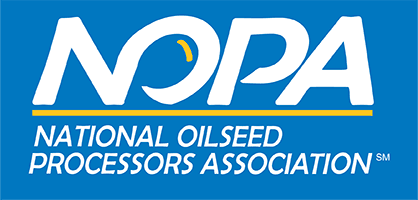NOPA to CARB: Vegetable Oil Cap Is Impractical, Could Bring Unintended Consequences
Association Reiterates Calls for CARB to Reject Vegetable Oil Cap
WASHINGTON, Oct. 16, 2024 – The National Oilseed Processors Association (NOPA) today reiterated its call for the California Air Resources Board (CARB) to reject the imposition of a vegetable oil cap and adopt a targeted, risk-based approach to sustainability requirements with increased scrutiny of waste feedstocks.
NOPA outlined the association’s position in comments submitted in response to CARB’s additional modifications to the Proposed Amendments to the Low Carbon Fuel Standard (LCFS) Regulation (Second 15-Day Package or Proposal). CARB has proposed a cap on vegetable oil feedstocks in biomass-based diesel (BBD) produced for California markets.
“While CARB’s proposal intends to diversify feedstock sources and promote sustainability, it will likely have the opposite effect,” NOPA President & CEO Kailee Tkacz Buller wrote. “Because vegetable oil is currently one of the most efficient and cost-effective feedstocks, limiting its use will constrain the supply of renewable diesel. Renewable diesel and biodiesel are crucial components of California’s efforts to reduce greenhouse gas emissions and transition to cleaner energy sources. This artificial limitation will create a supply-demand imbalance, driving up the costs of renewable diesel production and, consequently, the price at the pump for consumers.”
As in previous comments to CARB, NOPA continued to urge the inclusion of enhanced traceability and enforcement measures on waste feedstock imports, expressing disappointment that the Second 15-Day Package failed to include these additional measures.
NOPA also encouraged CARB to permit some level of mutual recognition for regions where crop-based feedstocks comply with another established sustainability system, noting the mention of Environment and Climate Change Canada’s Clean Fuels Regulations (CFR) in the Proposal.
“NOPA continues to encourage CARB to adopt a targeted, risk-based approach to implementing sustainability criteria under the LCFS. By accurately assessing deforestation risk, leveraging existing sustainability frameworks, and implementing targeted measures for high-risk regions, CARB can achieve its environmental objectives while also supporting a sustainable and resilient biofuels industry,” Buller wrote.
Read NOPA’s Comments: Proposed Low Carbon Fuel Standard Second 15-Day Package
Previous NOPA Comments to CARB:
- Joint Meeting of the California Air Resources Board and the Assembly Bill 32 Environmental Justice Advisory Committee (Sept. 12, 2024)
- Proposed Low Carbon Fuel Standard 15-Day Changes (August 27, 2024)
- Proposed Low Carbon Fuel Standard Amendments Public Workshop (May 10, 2024)
- Proposed Low Carbon Fuel Standard Amendments(Feb. 20, 2024)
###
Organized in 1930, the National Oilseed Processors Association (NOPA) represents the U.S. soybean, canola, flaxseed, safflower seed, and sunflower seed-crushing industries. NOPA’s membership is engaged in the processing of oilseeds for meal and oil that are utilized in the manufacturing of food, feed, renewable fuels, and industrial products. NOPA’s 16 member companies operate five softseed and 62 solvent extraction plants across 21 states, crushing approximately 95% of all soybeans processed in the United States, the equivalent to more than 2 billion bushels annually. More information at www.NOPA.org

